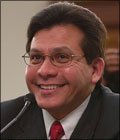The Appearance of an Independent Judiciary Goes Up in Smoke
 Alberto GonzalesThings are looking grimmer and grimmer for U.S. Attorney General Alberto Gonzales.
Alberto GonzalesThings are looking grimmer and grimmer for U.S. Attorney General Alberto Gonzales.
The scandal involving the firing of eight attorneys has led to accusations that Gonzales runs the U.S. Department of Justice (DOJ) to suit the Bush administration's right-wing political ideology instead of to protect the interest of citizens. Now Sharon Eubanks, the lead attorney in DOJ's racketeering case against the major American tobacco companies, has emerged to provide further evidence of judicial rigging.
Eubanks told the Washington Post that Bush administration political appointees within DOJ repeatedly ordered her to take steps to weaken the government's case against the tobacco industry. Eubanks says she was ordered to tell key witnesses change their testimony, was forced to ditch her own closing remarks and made to read closing arguments that her superiors had written for her. She also said that the DOJ team was told to greatly scale back its requests for remedies against the tobacco companies. At the time, high-ranking DOJ officials repeatedly claimed that there was no political meddling in the case. Skeptical public health advocates have been proved correct by Eubanks' recent remarks.
Sadly, political meddling in a tobacco case isn't surprising. President Bush has extensive ties to Big Tobacco. Karl Rove, Bush's chief political advisor, was for years a Philip Morris (PM) lobbyist and consultant in Texas, before moving to D.C. An internal PM email shows that after he failed to win re-election, Bush's father was feted around the country in PM's corporate jet. The company arranged and paid for numerous speaking events for "Poppy Bush," and delivered Molson Ice beer (a PM product) to his doorstep in Kennebunkport, Maine. In return, Poppy publicly promoted PM's Accommodation Program, which was designed to stave off legislated smoking restrictions.
Thanks to political meddling, DOJ's historic case against Big Tobacco ended with a whimper instead of a bang. Instead of positively impacting public health and ending Big Tobacco's more problematic practices, public servants doubling as corporate benefactors were rewarded. Eubank's boss during the tobacco case was Robert Davis McCallum, Jr., an old Yale classmate of the current president and the political appointee most frequently credited with scuttling the case. For his loyal service, McCallum was rewarded with a plum appointment as U.S. Ambassador to Australia, a country he reportedly had never been to and knew nothing about prior to his appointment.
To those asking whether politics is running the DOJ, I respond: Can there be any doubt that it is?




